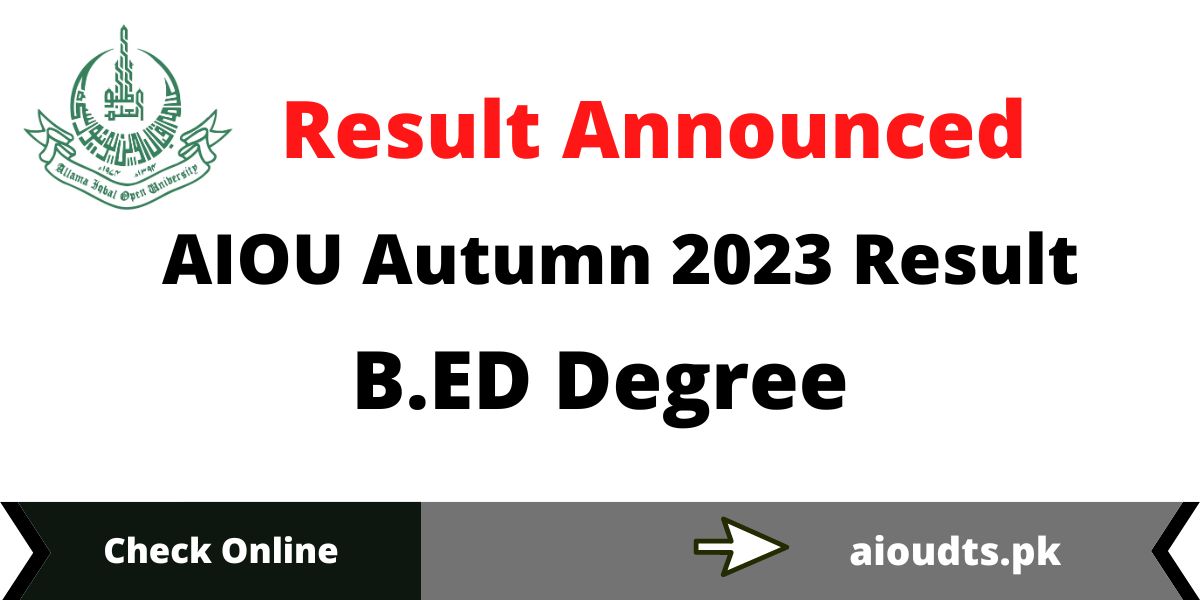The Allama Iqbal Open University (AIOU) has announced the much-anticipated results of the B.ED program for the Autumn 2023 session. Students who have been eagerly waiting can now check their results. This article provides a detailed guide on how to check your results and also sheds light on the degree process for the B.ED program at AIOU. You can Track your B.ED Degree Online.
Result Checking Methods for AIOU B.ED Autumn 2023
Students can check their B.ED program results using the following methods:
- Online Result Portal:
- Visit the official AIOU website.
- Click on the ‘Result’ section.
- Select ‘Autumn 2023’ from the semester drop-down menu.
- Enter your roll number in the provided field.
- Click on ‘Submit’ to view your result.
- SMS Service:
- AIOU also offers an SMS service where students can send their roll number to a designated number provided by the university.
- The result will be sent directly to your mobile phone.
- Result Cards:
- AIOU mails result cards to the registered address of the students within a few weeks of the result announcement.
- Students can also download and print their result cards from the AIOU website by following similar steps to the online result checking method.
Degree Process for B.ED Program at AIOU
The Bachelor of Education (B.ED) program at AIOU is designed for aspiring educators and focuses on enhancing teaching skills and educational theory. The program typically spans over four semesters, incorporating both theoretical coursework and practical teaching experiences.
Enrollment: Students are required to enroll in the B.ED program through AIOU’s official website or by visiting the university’s admission office during the designated enrollment period.
Coursework: The curriculum includes courses on modern teaching methods, classroom management, educational psychology, and curriculum development.
Assignments and Exams: Throughout the program, students must complete assignments and sit for examinations to assess their understanding and application of the course material.
Practicum: A critical component of the B.ED program is the practicum, where students gain hands-on teaching experience by working in educational settings under the supervision of experienced educators.
Completion: To successfully complete the B.ED degree, students must pass all courses and the practicum. After fulfilling all requirements, students are awarded their degrees during a convocation ceremony.
The announcement of the B.ED results is a significant milestone for students who have invested their time and efforts in their studies. AIOU ensures that the process to access the results is straightforward through their digital platforms and traditional methods. Students who have completed their B.ED degree are now equipped with the knowledge and skills to pursue successful careers in education.
We congratulate all the students on their achievements and wish them success in their future endeavours. For any further assistance, students can contact the AIOU helpdesk or visit the campus.
Scope of a B.ED Degree
A Bachelor of Education (B.ED) degree is essential for those looking to pursue a career in teaching and education. This degree not only provides the necessary academic knowledge but also equips graduates with practical skills to manage classrooms and design educational programs. Here’s a detailed look at the scope and opportunities that a B.ED degree offers:
1. Teaching Opportunities:
- Primary and Secondary Education: With a B.ED degree, graduates are primarily qualified to teach at primary and secondary levels in schools. This qualification is often a requirement for teaching positions in many countries.
- Special Education: Those interested in special education can specialize during their B.ED studies to work with children who have learning disabilities or special needs.
2. Educational Administration:
- Graduates can pursue roles in educational administration, including positions as school administrators, principals, and educational coordinators. These roles involve managing school operations, developing curricular activities, and overseeing staff.
3. Curriculum Development:
- B.ED holders can work in curriculum design, where they develop educational materials and programs. This role is crucial in shaping the instructional methods and materials used in schools.
4. Educational Consultancy:
- B.ED graduates can work as educational consultants, advising schools, non-profits, and educational organizations on teaching strategies, school improvement plans, and student engagement techniques.
5. Further Education and Research:
- Those who wish to delve deeper into educational theories and practices can pursue higher education such as a Master’s or Ph.D. in Education. This path is ideal for those interested in academic research or becoming professors at universities.
6. Tutoring and Private Coaching:
- Private tutoring is another avenue where B.ED graduates can apply their skills. Tutors are in high demand for subjects such as mathematics, science, and languages.
7. Educational Technology:
- With the integration of technology in education, B.ED graduates with a flair for technology can work in developing educational software, digital learning tools, or online learning management systems.
8. International Teaching Jobs:
- A B.ED degree is recognized internationally, which opens up opportunities for teaching in foreign countries. International schools across the globe often seek qualified teachers who hold a B.ED degree.
9. Non-Governmental Organizations (NGOs):
- NGOs involved in educational initiatives frequently hire B.ED graduates to work on projects that aim to improve educational access and quality, particularly in underprivileged areas.
10. Lifelong Learning Facilitator:
- B.ED graduates can work in adult education or lifelong learning centers, helping adults improve literacy, job skills, and personal development.
The B.ED degree is versatile and allows for a wide range of career opportunities in the educational sector. Whether one’s passion lies in direct classroom teaching, educational policy, or behind-the-scenes roles, a B.ED provides a solid foundation to influence and shape educational experiences and outcomes.
